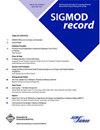Microsoft Azure认知搜索的主动资源分配策略
IF 1.3
4区 计算机科学
Q4 COMPUTER SCIENCE, INFORMATION SYSTEMS
引用次数: 0
摘要
现代云服务的目标是,当且仅当客户需要这些资源时,通过分配资源,在服务质量和运营成本效率之间找到中间地带。不幸的是,大多数工业需求驱动的资源配置方法都是被动的。考虑到扩展机制不是即时的,响应策略可能会给对延迟敏感的客户工作负载带来延迟,并浪费云服务提供商的运营成本。为了解决这个问题,我们定义了Microsoft Azure Cognitive Search的主动资源分配策略。除了当前的资源需求外,主动策略还考虑了典型的资源使用模式。在几个月的生产工作负载中,我们从这些模式中获得了以下有价值的见解。其一,由于持续的资源需求,87%的工作负载是稳定的。第二,根据几周的历史记录,90%的需求变化是可以预测的。第三,由于不同工作负载的大量空闲时间间隔,52%的时间可以回收资源。考虑到我们分析的规模和范围,我们相信我们的方法适用于任何对延迟敏感的云服务。本文章由计算机程序翻译,如有差异,请以英文原文为准。
Proactive Resource Allocation Policy for Microsoft Azure Cognitive Search
Modern cloud services aim to find the middle ground between quality of service and operational cost efficiency by allocating resources if and only if these resources are needed by the customers. Unfortunately, most industrial demand-driven resource allocation approaches are reactive. Given that scaling mechanisms are not instantaneous, the reactive policy may introduce delays to latency-sensitive customer workloads and waste operational costs for cloud service providers. To solve this catch-22, we define the proactive resource allocation policy for Microsoft Azure Cognitive Search. In addition to the current resource demand, the proactive policy takes the typical resource usage patterns into account. We gained the following valuable insights from these patterns over several months of production workloads. One, 87% of the workload is stable due to continuous resource demand. Two, 90% of varying demand is predictable based on a few weeks of historical traces. Three, resources can be reclaimed 52% of the time due to extensive idle intervals of varying workload. Given the size and scope of our analysis, we believe that our approach applies to any latency-sensitive cloud service.
求助全文
通过发布文献求助,成功后即可免费获取论文全文。
去求助
来源期刊

Sigmod Record
工程技术-计算机:软件工程
CiteScore
3.10
自引率
9.10%
发文量
41
审稿时长
>12 weeks
期刊介绍:
SIGMOD investigates the development and application of database technology to support the full range of data management needs. The scope of interests and members is wide with an almost equal mix of people from industryand academia. SIGMOD sponsors an annual conference that is regarded as one of the most important in the field, particularly for practitioners.
Areas of Special Interest:
Active and temporal data management, data mining and models, database programming languages, databases on the WWW, distributed data management, engineering, federated multi-database and mobile management, query processing & optimization, rapid application development tools, spatial data management, user interfaces.
 求助内容:
求助内容: 应助结果提醒方式:
应助结果提醒方式:


